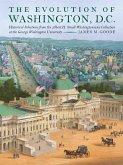The stirring history of a president and a capital city on the front lines of war and freedom.
In the late 1840s, Representative Abraham Lincoln resided at Mrs. Sprigg's boardinghouse on Capitol Hill. Known as Abolition House, Mrs. Sprigg's hosted lively dinner-table debates of antislavery politics by the congressional boarders. The unusually rapid turnover in the enslaved staff suggested that there were frequent escapes north to freedom from Abolition House, likely a cog in the underground railroad. These early years in Washington proved formative for Lincoln.
In 1861, now in the White House, Lincoln could gaze out his office window and see the Confederate flag flying across the Potomac. Washington, DC, sat on the front lines of the Civil War. Vulnerable and insecure, the capital was rife with Confederate sympathizers. On the crossroads of slavery and freedom, the city was a refuge for thousands of contraband and fugitive slaves. The Lincoln administration took strict measures to tighten security and established camps to provide food, shelter, and medical care for contrabands. In 1863, a Freedman's Village rose on the grounds of the Lee estate, where the Confederate flag once flew.
The president and Mrs. Lincoln personally comforted the wounded troops who flooded wartime Washington. In 1862, Lincoln spent July 4 riding in a train of ambulances carrying casualties from the Peninsula Campaign to Washington hospitals. He saluted the One-Legged Brigade assembled outside the White House as orators, their wounds eloquent expressions of sacrifice and dedication. The administration built more than one hundred military hospitals to care for Union casualties.
These are among the unforgettable scenes in Lincoln's Citadel, a fresh, absorbing narrative history of Lincoln's leadership in Civil War Washington. Here is the vivid story of how the Lincoln administration met the immense challenges the war posed to the city, transforming a vulnerable capital into a bastion for the Union.
In the late 1840s, Representative Abraham Lincoln resided at Mrs. Sprigg's boardinghouse on Capitol Hill. Known as Abolition House, Mrs. Sprigg's hosted lively dinner-table debates of antislavery politics by the congressional boarders. The unusually rapid turnover in the enslaved staff suggested that there were frequent escapes north to freedom from Abolition House, likely a cog in the underground railroad. These early years in Washington proved formative for Lincoln.
In 1861, now in the White House, Lincoln could gaze out his office window and see the Confederate flag flying across the Potomac. Washington, DC, sat on the front lines of the Civil War. Vulnerable and insecure, the capital was rife with Confederate sympathizers. On the crossroads of slavery and freedom, the city was a refuge for thousands of contraband and fugitive slaves. The Lincoln administration took strict measures to tighten security and established camps to provide food, shelter, and medical care for contrabands. In 1863, a Freedman's Village rose on the grounds of the Lee estate, where the Confederate flag once flew.
The president and Mrs. Lincoln personally comforted the wounded troops who flooded wartime Washington. In 1862, Lincoln spent July 4 riding in a train of ambulances carrying casualties from the Peninsula Campaign to Washington hospitals. He saluted the One-Legged Brigade assembled outside the White House as orators, their wounds eloquent expressions of sacrifice and dedication. The administration built more than one hundred military hospitals to care for Union casualties.
These are among the unforgettable scenes in Lincoln's Citadel, a fresh, absorbing narrative history of Lincoln's leadership in Civil War Washington. Here is the vivid story of how the Lincoln administration met the immense challenges the war posed to the city, transforming a vulnerable capital into a bastion for the Union.
Dieser Download kann aus rechtlichen Gründen nur mit Rechnungsadresse in A, D ausgeliefert werden.









